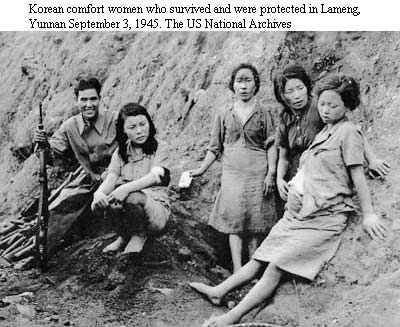|
In ordinary comfort stations soldiers were paying a certain sum of money directly or indirectly. The sum of money was usually divided into halves between proprietor and comfort women. But it was not clear whether the sum of money was handed to women surely.
Holiday came once in a month, and rarely two days weregiven. There were comfort stations working without holidays. Going out of comfort stations was possible only with permission of the military.
The records of a prisoner-of-war interrogation conducted by the US military include the claim that, at a comfort station run by a Korean manager in Myitkyina, Burma, the women were free to go on outings, participated in sports, and had picnics, giving the impression that the comfort woman had an elegant lifestyle. However, we might take into account the fact that these were testimonies before the US military interrogators.

As the war situation deteriorated for Japan, life at the comfort stations generally became even more miserable.
The women were forced to follow the military time after time, and had no freedom whatsoever. When the Japanese military began retreating from one place to another in Southeast Asia, the women were either abandoned or destined to share their fate with defeated military. Some perished and others narrowly escaped to be protected by the United forces.
The Pacific War ended on 15 August 1945, but Those comfort women who suvived could not return home easily. It is known that many women gave up the idea of returning to their home out of a feeling of shame and remained in a foreign land, staying there for the rest of their days. Among those Korean women taken to China who remained there after the war some returned to South Korea only in 1990s.
In many cases, those who returned home were suffering from injuries and went through life miserably, unable to forget past cruelties. Many suffered from physical disabilities and venereal disease, and were unable to bear children. Others could not marry. And those who did eventually marry often had to conceal their past, unable to tell others of the pain they felt in their hearts. This would have been one of the heaviest burdens to bear. The women have lived for more than half a century after the war, suffering practically as much as they did during the several years they spent in military comfort stations.
|

